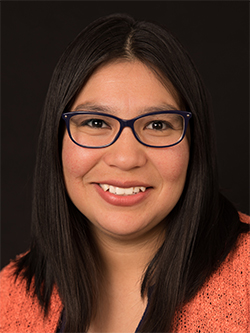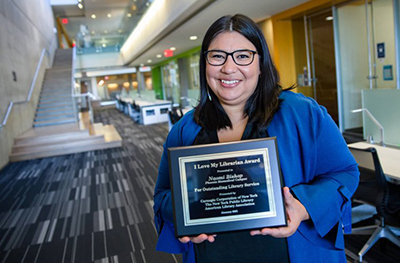 Naomi Bishop is an outspoken voice for American Indian children’s literature. She’s an advocate for public health. She’s a proponent of racial equity. Above all, she’s a believer in the power of information to improve people’s lives.
Naomi Bishop is an outspoken voice for American Indian children’s literature. She’s an advocate for public health. She’s a proponent of racial equity. Above all, she’s a believer in the power of information to improve people’s lives.
Those are just some of the reasons Bishop, MLIS ’10, has been named the recipient of the UW Information School’s 2021 Distinguished Alumni Award, chosen by Dean Anind Dey from a set of finalists selected by past honorees, alumni and iSchool staff.
When Bishop began the Master of Library and Information Science program in 2008, she was the lone Native American master’s student at the iSchool. She took a leap of faith after visiting Seattle and meeting Cheryl Metoyer, then the associate dean for research; and Ph.D. students Miranda Belarde-Lewis and Marissa Duarte, who are now faculty members at the iSchool and Arizona State University, respectively.
“I thought if there’s Indigenous grad students there, it must be a good place,” said Bishop, a member of the Akimel O’odham (Pima) tribe in Arizona’s Gila River Indian Community.
After earning her MLIS, Bishop made stops at academic libraries at the University of Notre Dame, University of Denver and Northern Arizona University before going home to the University of Arizona, where she earned her undergraduate degree. As the health sciences librarian at the College of Medicine at the university’s Phoenix campus, Bishop’s main role is to support students who are working on their medical degrees. She helps students and faculty conduct research, teaches and leads workshops, and promotes community initiatives at the school.
One of her initiatives at her library was a display about access to health care among Native people in Arizona. When the COVID-19 pandemic hit, students knew about the challenges faced by tribal communities and responded by conducting a donation drive to bring personal protective equipment to them.
“I wasn’t behind all of that, but our students were engaged, I think, because they were exposed to that information and knew there was more to this community,” Bishop said.
“She did a very powerful presentation, and it was especially meaningful because she was speaking about her own community.”
She also had an influence on policy in Maricopa County, Arizona, where she lives. In the early stages of the pandemic, a doctor from the county Board of Volunteers reached out to her, asking what research was available about the efficacy of cloth masks in preventing the virus from spreading. Bishop put her librarian skills to work, gathering information from countries where masks were more commonly worn. City and county leaders cited the information she provided in justifying their vote to enact a mask mandate in public spaces.
On campus, she’s been outspoken about implicit bias in medical literature, prompting changes to the university’s curriculum. She recently co-wrote in a journal arguing that structural racism, discrimination and assimilation need to be accounted for as factors that contribute to health problems.
For example, she noted that doctors have been taught that Native Americans are susceptible to conditions such as diabetes, simply because they get the disease at higher rates than whites. But factors such as the removal of tribes’ traditional water sources go unaddressed as public health concerns.
“Instead of just saying, ‘Here are these problems,’ let’s address why,” Bishop said. “Let’s think about food and access to water and what’s being done to address that.”

Bishop’s leadership on social justice issues was among the reasons she was chosen from 1,865 nominees as the winner of the I Love My Librarian Award, given annually by the American Library Association with support from the Carnegie Corporation and the New York Public Library. In the past, she has also been a recipient of the American Indian Library Association’s (AILA) Rising Leader Award and a participant in the 2010 ALA Spectrum Leadership Institute. While at the iSchool, she had support from the Sylvia Lake Finley Multi-Ethnic Library Fellowship.
Metoyer, who was among Bishop’s mentors at the iSchool, recalled that she brought the same determination and critical thinking on social justice issues to her classes at the UW. For one assignment, Bishop did a presentation on the cultural importance of how people, places and things are named and renamed, using her own tribe as an example.
Europeans’ approach was, “You erase the name of the place, you erase the name of the people, and you rename it so it fits within your lexicon,” Metoyer said. “She did a very powerful presentation, and it was especially meaningful because she was speaking about her own community.”
Bishop remains active in AILA, pressing for inclusion of Native authors and helping to choose the winners of its Youth Literature Awards. She and other advocates notched a recent success when the Association for Library Service to Children announced that AILA’s awards would be part of its slate of youth media prizes, along with the Newbery Medal, Caldecott Medal and other prestigious awards.
Inclusion in the awards will open up more opportunities for Native authors to tell their stories, Bishop said.
“That was the whole point of our awards — to get major publishers to see Native talent, to see Native artists and illustrations done in the most beautiful way to tell our stories,” she said. “Let these Native people publish and you will get incredible stories, real stories of life and love, and Caldecott winners and Newbery winners.”